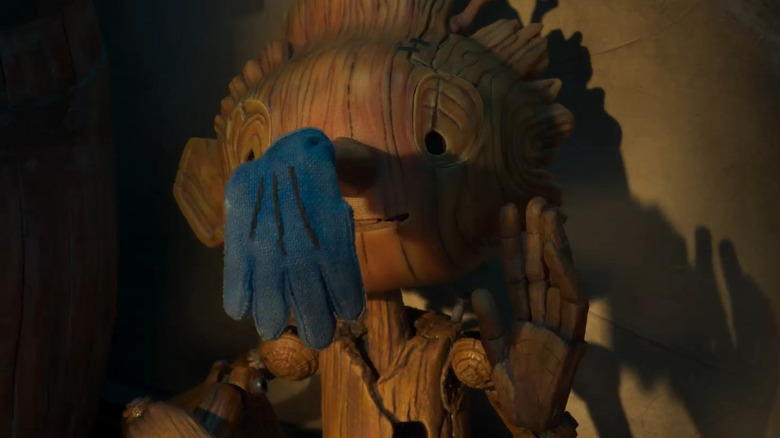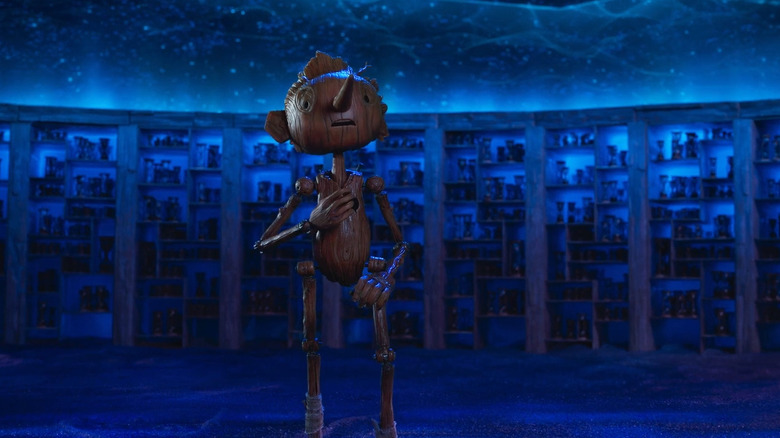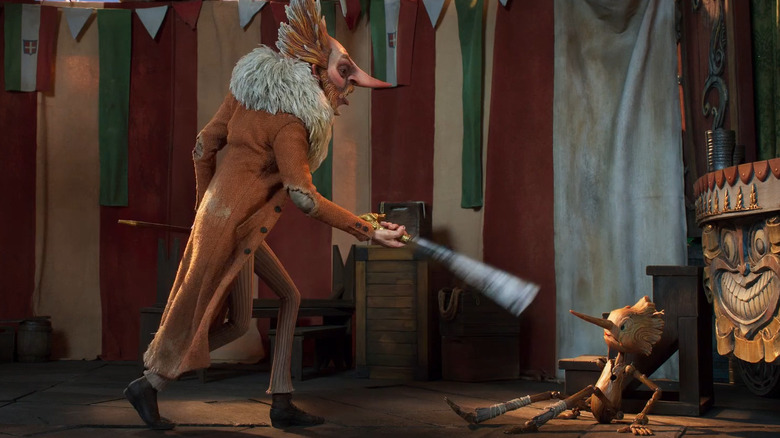Guillermo Del Toro Purposely Changed Up The Classic Pinocchio Story To Be 'Contrarian'
Adapting literary fairy tales from the page to the screen is a colossal task because it presents the filmmaker with a challenge to capture the spirit of the source material while bringing their own brand of imagination. Based on Carlo Collodi's 1883 novel "The Adventures of Pinocchio," the story of a wooden boy coming to life has had so many different interpretations across so many different mediums. Although when most people think of the story, the 1940 animated Disney film is the one that will likely pop into your head first.
Even when it strayed from Collodi's story, the film has endured across the decades because the signature Disney animation has been cemented in our minds. Roberto Benigni's "Pinocchio" has also been cemented in my head, albeit for a more terrifying reason. The story persists because the best fairy tales are timeless metaphors for the lessons we must learn in life, and then there's whatever Robert Zemeckis ("Back to the Future") did with his soulless live-action remake of the Disney film.
But if you're looking for a more visionary adaptation of "Pinocchio" this year, it looks like Netflix has you covered. Fairy tales are built upon the foundation of imagination, and fewer living filmmakers possess the amount of whimsy than that of Guillermo del Toro ("The Shape of Water").
A whole different take on the classic story
In a press junket attended by /Film's Jeremy Mathai, co-director Mark Gustafson spoke about how the screenplay from del Toro and Patrick McHale is what interested him in the project. He could see that this was reason enough to tell this story over again through a much different lense:
"What I really found attractive about this story, at first, was the way that Guillermo and Patrick turned it on its ear, the central conceit of the story, they flipped. And what that does is it opens up the story in a completely different way. So you get to make different choices. And also is the reason why this is worth telling again, because we have a completely new take on it. And yet it still lives within the world of Pinocchio."
In addition to del Toro's involvement, this is exactly the reason why I'm really looking forward to "Pinocchio." Where Zemeckis cut, copied, and pasted the 1940 film into live-action, everything I've seen so far from del Toro and Gustafson's film feels new – especially with the titular character himself. For example, Pinocchio appears as if he's actually made out of an oak tree.
But that's only one of many significant changes del Toro and Gustafson are making to the time-honored fairy tale.
No strings to hold Guillermo del Toro down from playing with the source material
In that same press junket, del Toro talks about how being contrarian in her version of the story is exactly what he set out to do. This isn't to say that everything you know from the original story has been changed, but it was necessary to make it feel like something new and different:
"One of the biggest sort of juggling acts we have is the movie should flow and the themes are war and the period and fatherhood and all that should meld, and you should recognize the story of Pinocchio. But you should see the difference of what takes the place of Pleasure Island. What takes the place of the day he goes to school and fails — each of those beads will be there, but the way we execute them is very different and sometimes, as I said, contrarian."
Rather than all of these individual life lessons used to teach Pinocchio a lesson on how to be a real boy, this film thrust the wooden puppet on a journey with somehow even more dire consequences.
It's important to make note of this because "Pinocchio" takes place in pre-World War II Italy, as the rise of fascism is rearing its ugly head. How timely. To make matters worse, rather than being sold into show business, Pinocchio gets in way over his head as a soldier for the hateful army.
Needless to say, it appears that del Toro's animated stop-motion adventure is going to be unlike anything we've ever seen before involving the wooden puppet.
Guillermo del Toro's "Pinocchio" will premiere on Netflix sometime in December 2022.


